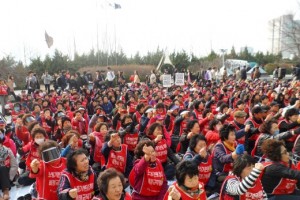Janitorial and Security Workers Fight On
RIAWM International Department
There are over 400,000 janitorial workers in South Korea. Of these, only 7,853, roughly 2%, were members of labor unions as of 2011. Only 2% of some 400,000 janitorial workers in Korea are organized. Despite this low figure, Korean janitorial worker' struggle has received considerable attention for many reasons. In particular, Korean janitors have refused to be satisfied with South Korea's miserable minimum wage. They have fought for and won a collective bargaining agreement that guarantees them wages above the legal standard. In addition, Korean janitors have built solidarity across workplaces and succeeded in carried out joint collective bargaining.
Last year, janitorial and security workers organized by the KCTU-affiliated Korean Public Service and Transportation Workers Union (KPTU) at 3 universities (Korea University, Yonsei University and Ehwa University) and one hospital (Korean University Hospital), made the first attempt at a multiple worksite struggle and joint collective bargaining. The general strike of these workers - the majority elderly women - carried out on March 8, International Women's Day, made a lasting impression on the Korean labor movement. Through their struggle, these workers won a collective agreement guaranteeing them an hourly wage of 4,600 won (roughly $4), 240 won above the current legal minimum. The effects of that victory were felt throughout Korean society. Notably, 4,600 won served as a standard for the tri-partied minimum wage committee in its deliberations on a new standard for 2012.
This year the janitorial and security workers have expanded their struggle. Workers at Hongik University and Kyung Hee University have joined the four other worksites to fight for a joint collective agreement. The workers began by demanding an increase to 5,410 won half the average for all workers. As of now, they have reached a preliminary agreement for 5,100 won.
Unfortunately, this year the janitorial and security workers face new challenges. This is because of a revision to the Korean labor law that went into effect on July 1, 2011, which allows more than one union to be formed at a workplace, but require that their be only one bargaining representative. After the law was passed, yellow unions were formed and the school administrations and subcontracted cleaning companies have used them as an excuse to refuse to bargain with the democratic unions.
The yellow union at Hongik University is becoming a major obstacle to the workers' goals. The yellow union has agreed to a low wage with the employer and is trying to convince the KCTU-KPTU union members to agree to accept the same standard. The employer is using this as an excuse to refuse negotiations with the democratic union.
Workers at all worksites have agreed that they will not leave their comrades at Hongik University behind. They began the fight together and will end it together and so are confronting the Hongik yellow union and will not sign a collective bargaining agreement unless it includes the Hongik democratic union members.
Throughout history, Korean labor law has been used to repress workers. And throughout history, Korean workers have fought back in the fact of that repression. The story of the janitorial and security workers is one and the same.
